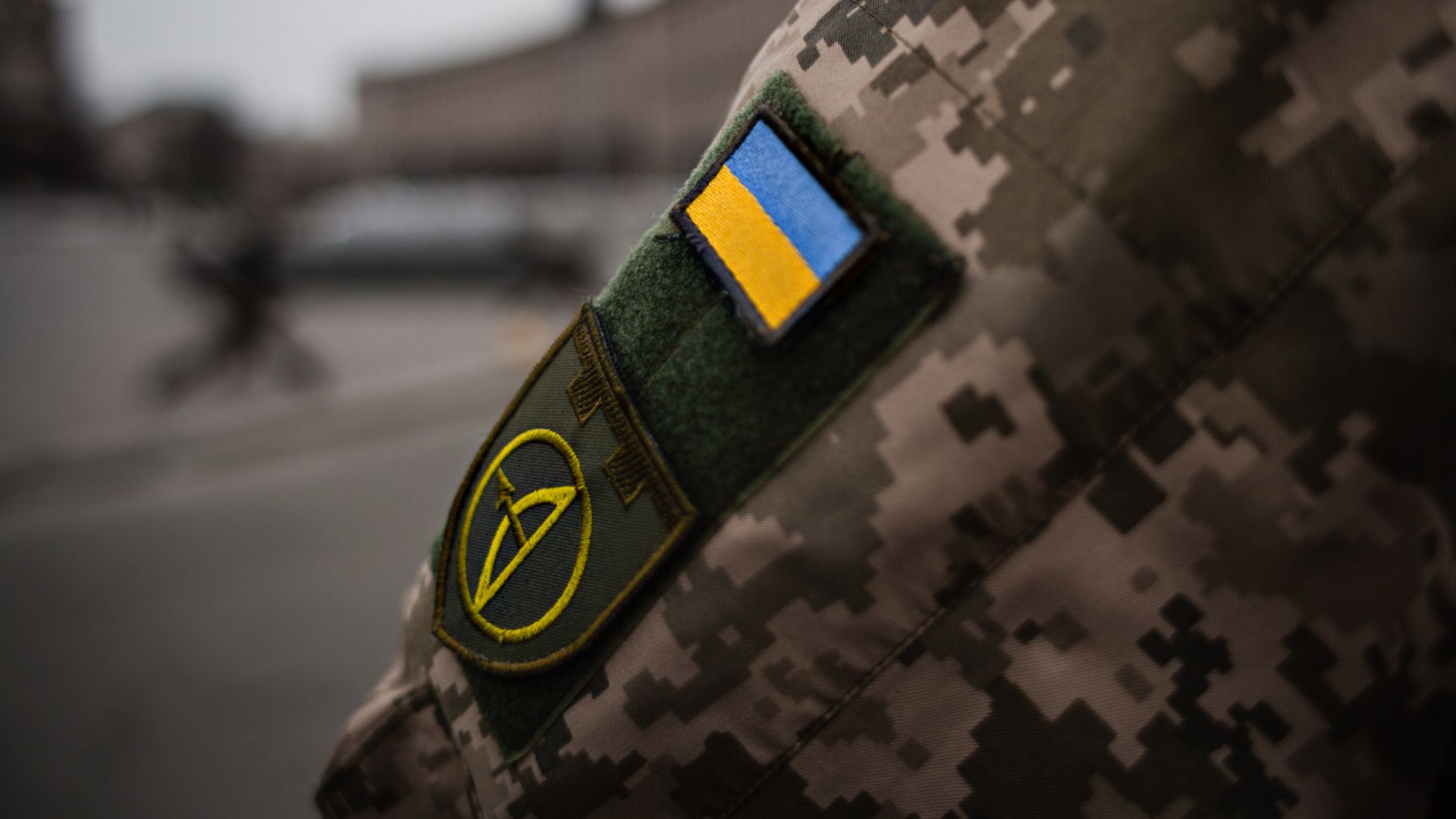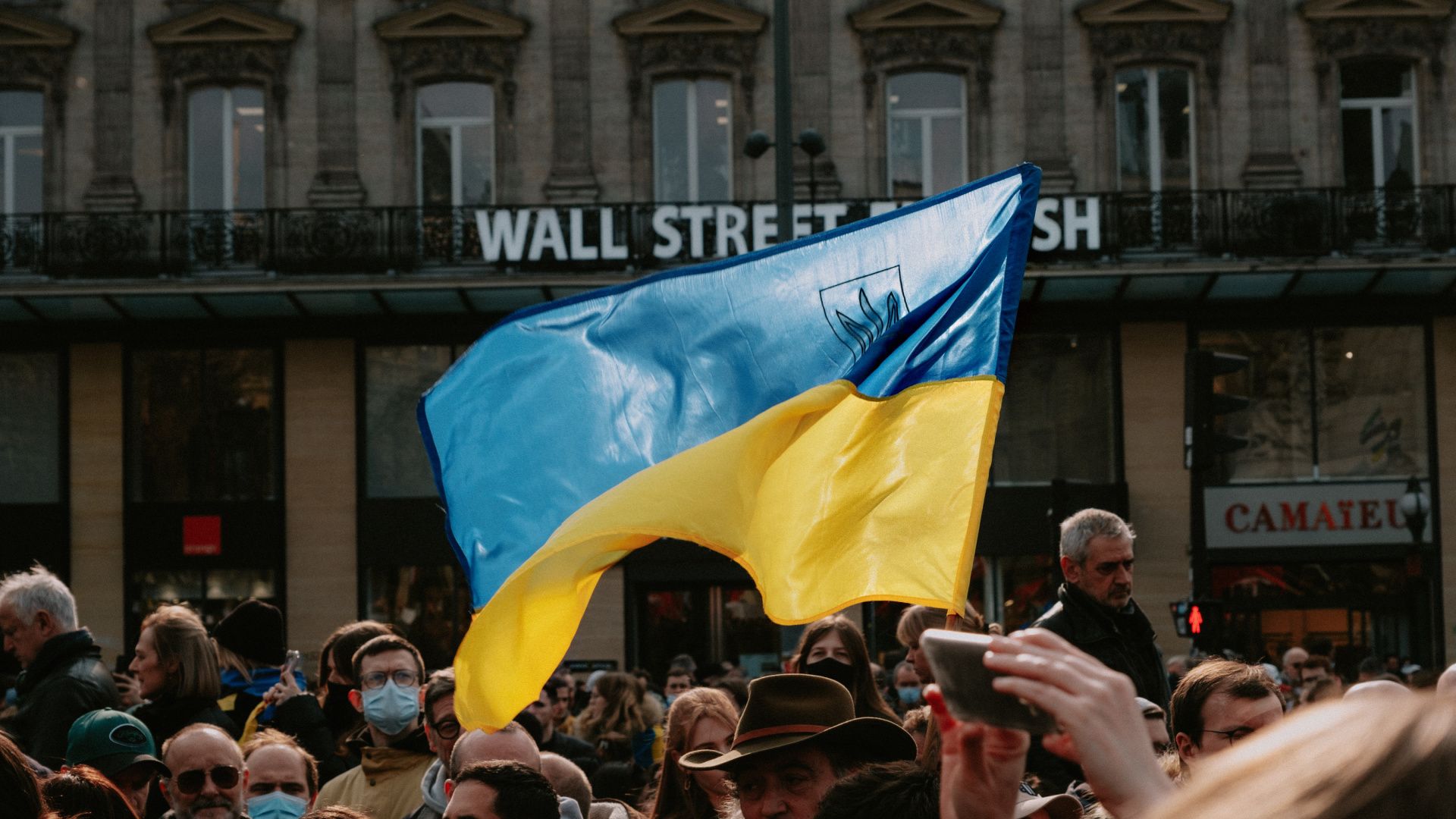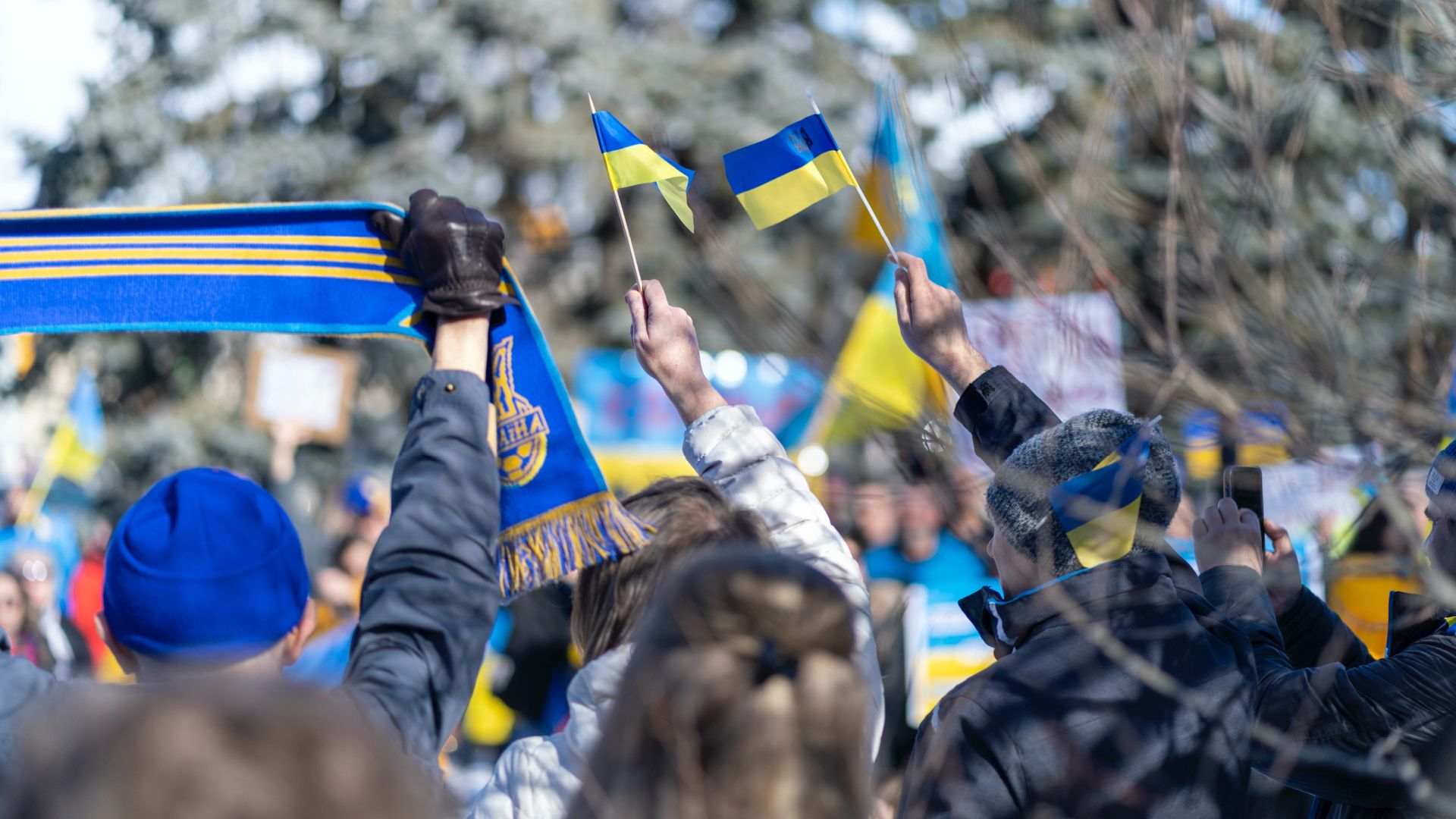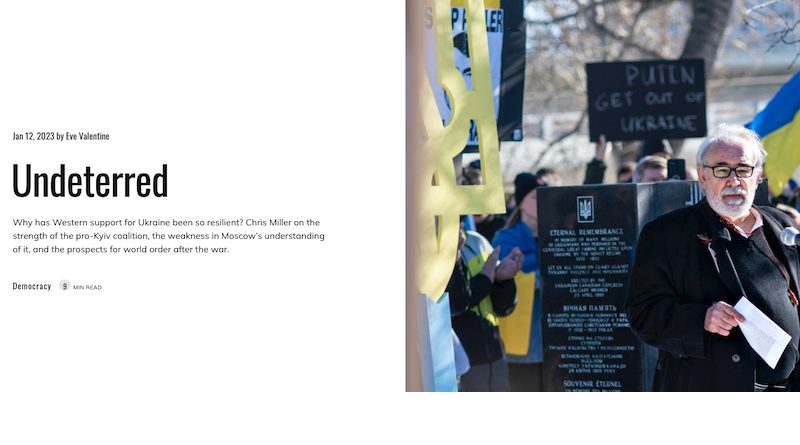Undeterred
By Eve Valentine, with Chris Miller, Associate Professor of International History at The Fletcher School of Law and Diplomacy
Why has Western support for Ukraine been so resilient? Chris Miller on the strength of the pro-Kyiv coalition, the weakness in Moscow’s understanding of it, and the prospects for world order after the war.
After Russian military forces invaded Ukraine in February, support for the embattled republic swept across the West, as did condemnation of Putin’s aggression—and the threat it represented to the whole idea of democratic sovereignty. Ukraine’s resilience since has won global admiration, and been a source of global inspiration, but that resilience hasn’t come without cost in the West: The protracted war that’s resulted has driven energy and fuel prices dramatically higher—and inflation to levels unseen since the 1980s. And the spike in energy costs, in particular, has provoked public protests in a number of European countries. Yet support among strong majorities in the European Union, the United States, and other democratic countries remains firm. Why is that?
Chris Miller is an assistant professor of international history at Tufts University’s Fletcher School of Law and Diplomacy, and the author of the new book Chip War: The Fight for the World’s Most Critical Technology. To Miller, there’s a confluence of reasons: Ukraine’s battlefield success has won the confidence of global publics; Kyiv’s careful management of its allies has won the confidence of Western leaders; and Russia’s own leadership has meanwhile made so many mistakes, and suffered so many setbacks, that it no longer looks like the overwhelming imperial menace it appeared to be a year ago. All of which has supported a powerful moral consensus throughout the West. Russian elites, meanwhile, remain confused by this consensus, expecting it to have collapsed by now. The biggest question, to Miller, is how Moscow will adapt to a global reality it didn’t anticipate—through the end of the war and in its eventual aftermath.
Eve Valentine: Why do you think we haven’t seen any real signs of fatigue in Western support for Ukraine?
Chris Miller: It’s a pivotal question. A year ago—or even nine months ago—there were many, many predictions that the West would get tired of supporting Ukraine, and you’re right, that hasn’t really happened to any appreciable degree—in the U.S. or in Europe.
I think there are a few reasons why. First, the Ukrainians are, by all metrics, winning. They’ve steadily taken back territory from the Russians since Spring 2022. And on the back of those victories, it’s been very straightforward for supporters in the West to point out the very tangible benefits that supporting Ukraine has had on the battlefield.
Second, I think the Ukrainians have overall been very responsive and responsible about escalation risks. And because of that, it’s clear that U.S. President Biden and many European leaders aren’t concerned about the war spiraling beyond its boundaries. Although the Ukrainians have certainly wanted to push back against the Russians and hit them everywhere they can, they’ve also been mindful of the escalation risks that are certainly on the minds of Biden and other Western leaders. And so, while there are certainly disagreements, this has enabled a surprisingly smooth relationship, given all the complexities involved—between the U.S. and Ukraine, as well as European countries and Ukraine.

And then third, a lot of the ominous predictions about ways that Russia might try to expand the war beyond its current framework haven’t happened. In the early stages of the war, we were seeing forecasts of Russian cyber attacks in the West, of Russian nuclear attacks, and all sorts of other escalations that haven’t happened. Now, this doesn’t mean they can’t happen in the future. But the fact that they haven’t happened, so far, has provided a lot of of space for Ukraine’s supporters to say that not only are the benefits of support real in terms of battlefield success, but the costs are limited in relation to some of the catastrophic predictions people were making in the earlier stages of the war.
Valentine: There’s clearly a strong moral component in all of this—a view of Moscow as the authoritarian Goliath and Kyiv as the democratic David. How much do you think the overarching ethical sense of right and wrong is contributing to this enduring support for Ukraine?
Miller: There’s no doubt, the fact that Russia is the aggressor and Ukraine has been defending itself has shaped the way people in every Western country are looking at the situation.
Although the Ukrainians have certainly wanted to push back against the Russians and hit them everywhere they can, they’ve also been mindful of the escalation risks that are certainly on the minds of Biden and other Western leaders. And so, while there are certainly disagreements, this has enabled a surprisingly smooth relationship, given all the complexities involved.
It’s striking, because there are many instances in international politics where moral dynamics aren’t matched by action—and where there are catastrophes that unfold or aggressions that go unpunished. What’s notable about this case is that it’s not only been that Western publics recognize that Russia is the aggressor and Ukraine is the victim; it’s that they’ve taken real steps to do something about it. More often, that’s not the case.
Valentine: Thinking about those real steps, the U.S. and other Western countries are spending considerable taxpayer money to support the war—or rather, Ukraine’s defense. Overall, the costs are still relatively low, and Western soldiers aren’t directly fighting; but on the other hand, we see energy costs rising by 500 percent in some European countries. How are people across the West perceiving the cost of the war for themselves?
Miller: The answer to that question has changed somewhat. In the U.S., the primary impact was on gasoline prices, which spiked last year but have since fallen back to more normal levels. And where it comes to the direct transfer of funds or military aid, the overall dollar value is still small relative to the rest of U.S. government spending. So the typical American isn’t really feeling any direct impact on his or her life.

In Europe, it’s very different, because there’s been a major impact, not just on oil markets, but on natural-gas markets—where you’re seeing prices spike dramatically. And that’s driving inflation higher across much of Central and Eastern Europe.
But the effect of those price increases has been counteracted by the fact that, especially in those regions, there’s a very strong historical memory of Russian occupation and Soviet dominance during the Cold War. And because of that, the willingness to pay is quite high.
The one country that dynamic doesn’t apply to as much is Germany, which is paying extremely high prices—and is much less unified around pushing back against the Russians. But even still, we’ve seen steady increases in the German government’s support for Ukraine militarily, and we’ve seen no real fracturing politically; the political consensus across all the major parties in Germany on this issue has held. So even in Germany, the weakest link in the Western coalition, the overall story has been one of remarkable unity rather than disagreement—and remarkable support for the pro-Ukraine coalition instead of any real push to fracture it and find a way to end the war on more pro-Russian terms.
Even in Germany, the weakest link in the Western coalition, the overall story has been one of remarkable unity rather than disagreement—and remarkable support for the pro-Ukraine coalition instead of any real push to fracture it and find a way to end the war on more pro-Russian terms.
Valentine: Back in the U.S., the Republican Party now controls the House of Representatives, meaning they control the budget—and could cut funding for Ukraine, as a number of Republicans have indicated they want to do. How likely do you think it is that Washington will reduce its financial support for Ukraine in this context?
Miller: I think we hear a lot more talk than is warranted, honestly, about the chances that the U.S. government will reduce its support for Ukraine. If you look at the votes in Congress, they’ve been overwhelmingly in favor of both economic and military aid. And if you look at the number of Republicans in the House that have voiced real skepticism, it’s really a small number.
I’d distinguish those who’ve said there needs to be more oversight—which is a pretty innocuous thing to say and hard to disagree with—from those who’ve actually opposed aid to Ukraine. So I’m quite skeptical that we’re going to see any meaningful change in U.S. policy driven by Congress over the next couple of months, if ever.
For people in the press who want to write headlines about the possibility of the political coalition supporting Ukraine in the U.S. coming apart now—it’s true, they can find members of Congress who’re taking one or another sort of anti-Ukraine view. But the number of people in Congress actually taking that view is very small.

Valentine: Some analysts have said that, after his initial failures, Putin was really betting on support across the West fading. But if it isn’t, how do you see this potentially affecting Moscow’s strategy?
Miller: I think the key here is that, over the last decade, the Russian elite has repeatedly overestimated the extent of division in the West—and now they’ve overestimated its unity and resolve in Ukraine.
If you look at what this elite has been saying, and how that’s been refracted in Russian media, and then you compare it with actual debates in Europe, what you’ll find is that the Russians regularly interpret very standard differences of opinion as representing a fundamental crisis—when in reality, it’s just the push and pull of democratic politics.
You’ll see the same thing with regard to disputes between the U.S. and Europe, which have been part and parcel of the transatlantic relationship since the end of World War II. Russian elites repeatedly interpret this as a potential turning point in In transatlantic relations—when in fact, it’s just normal diplomacy.
So I think the Russians have read way too much into routine disagreements in the West, and that’s led them to put far too much faith in the strategy that they bet on—which is that we in the West are going to get divided or distracted, or some both, and as a result, cut aid to Ukraine. It’s a strategy based on false assumptions and inaccurate interpretations. But the Russian elite has been highly invested in these assumptions and interpretations, so it’s been hard for them not to make this strategic mistake.
The Russians have read way too much into routine disagreements in the West, and that’s led them to put far too much faith in the strategy that they bet on—which is that we in the West are going to get divided or distracted, or some both, and as a result, cut aid to Ukraine. It’s a strategy based on false assumptions and inaccurate interpretations.
Valentine: Do you think Russian elites also overestimated internal national divisions in the West—perhaps especially in the United States and Germany?
Miller: I think that’s right. There’s just a lot of wishful thinking on the Russian side. Of course, they’re not the only ones subject to wishful thinking. But they’re highly dependent on it. They’ve been reading the headlines, and seeing some Republicans and some Democrats skeptical of the current approach—and they’ve thought that it represented the leading edge of a bigger change, rather than just the view of a minority in both parties.
I also think, if you look in particular at the European dynamics, that the Russians were operating with a model—one many Western analysts were working with too—in which the actions of European elites, and especially German elites, were going to be driven mainly by economic issues. And that just hasn’t happened. European leaders have taken on very significant costs with higher energy prices, and they’ve swallowed them, without changing course on Ukraine.

Valentine: To what extent does the apparently firm and lasting support for Ukraine, and antipathy toward Russia, suggest to you that the dynamics of global politics are changing—even possibly along lines of greater hostility between the West, on one side and, Russia and China on the other, not unlike the Cold War?
Miller: There’s little doubt in my mind that this war—unlike the annexation of Crimea in 2014 or the war in Georgia six years earlier—is going to have longer and more significant repercussions for Russian-Western relations beyond the end of the war.
But I’m not inclined to think that this is going to blind Western leaders to the realities of international politics or Russian politics. And if by some mechanism, we end up seeing a change in Russia’s leadership, or a significant change in Russian politics, years down the road, I don’t think this war will necessarily make it impossible to improve relations.
The war has certainly dispelled some illusions among the U.S. and European leaderships about the current Russian leadership—and what can be expected from it. So in that sense, the war has created a more conflictual attitude. But I don’t think we should expect that to be unchanging. I think it’s going to be responsive to the realities in Russia—and to the way the war develops and, hopefully, at some point not too long from now, ends.
This interview is republished from The Signal.

